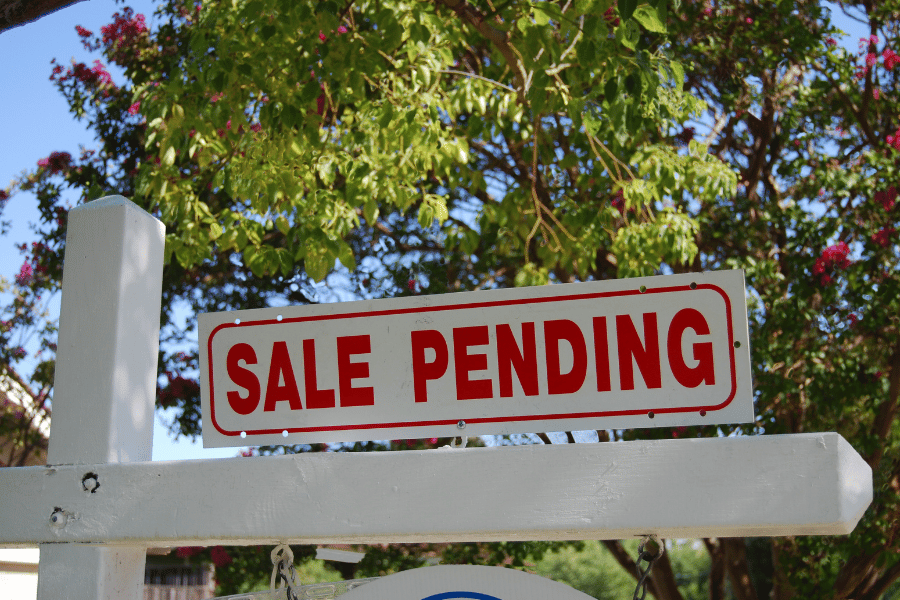Understanding Contingent Status in Real Estate
What does contingent mean when buying a house? Learn what contingent means in real estate, how it differs from pending, and whether you can still make an offer.
When searching to buy a home, you may have encountered various sales statuses online, including contingent real estate listings. Beyond "for sale" and "closed," you may have also seen other sales statuses such as "pending" or "contingent."
These phrases indicate where the home is in the sales process. Understanding the differences between these statuses can help you identify properties that may still be available for purchase. It will help you better understand how to move forward if you're interested in putting in an offer on any of them.
A contingency clause doesn't necessarily mean all hope is lost for prospective buyers. States have different laws surrounding contingencies, so you'll want to speak with your Realtor about the current local rules for contingent homes.
In todays real estate market, where inventory remains tight and competition stays fierce, understanding the difference between contingent, pending, and active listings can mean the difference between landing your dream home in Raleigh and watching it slip away to another buyer.
Understanding contingent status can be the key to navigating your home search strategically. Whether you are a first-time buyer navigating unfamiliar territory or a seasoned homeowner looking to upgrade, this information will empower you to act confidently and strategically.
Here is what contingent means in real estate
1. What Does Contingent Mean?
When a home is listed as contingent, it means the seller has accepted an offer, but the sales has not closed yet because certain conditions, or contingencies, must be met first.
Think of it as a "yes, but..." agreement. The seller has said yes to a buyer's offer, but specific requirements need to be satisfied before the transaction can move forward to closing.
For instance, a buyer may place an offer on a home, but the offer is contingent on the buyer selling their current home first or obtaining a mortgage. Also, the buyer will want to ensure the house is in good condition during due diligence to ensure the property is in good shape.
There are several reasons a home marked as contingent may 'fall through,' though it does not happen often here in Raleigh. These contingencies protect buyers by giving them legitimate ways to back out of the contract without losing their earnest money deposit if certain conditions aren't met.

2. What to Expect from a Home Marked Contingent
In our local market here in Raleigh or Cary, it is unlikely that a home will be marked contingent and not get the closing table because North Carolina is unlike other markets.
Once a contract is accepted, both buyer and seller have contractual obligations to live up to, and only the buyer may back out at that point. The seller cannot accept another offer. However, it still does happen when a deal falls through.
Most buyers will receive a mortgage preapproval from a mortgage lender before submitting their offer, which helps them understand whether or not they can qualify for a mortgage before making the offer on the home.
This preapproval letter doesn't mean the information the buyer provided is accurate. The mortgage contingency is often why a buyer is forced to walk away from a house.
If the buyer lies about their assets, income, or whether or not they have paid the prior year's taxes, the preapproval letter might mean nothing. With low interest rates, most buyers can find ways to qualify for their home purchases.
A contingency comes into play when the buyer already has a contract in hand and a closing date on the calendar for their current home. The property does not change to sold status until closing, so the contingency protects the buyer if the sale falls through for any reason.
This type of contingency does not allow the seller to accept other offers on the property for a certain period because they have contractual obligations. The seller may still accept backup offers when the home is marked contingent.
When you see a contingent listing in Raleigh, here's what's typically happening behind the scenes:
Active Negotiations: The buyer and seller are working through the contingency period, which usually lasts 30-60 days depending on the type of contingencies involved.
Inspection Phase: The buyer is likely conducting home inspections, potentially discovering issues that need repair or renegotiation.
Financing in Progress: The buyer's lender is processing their mortgage application, ordering an appraisal, and working toward final loan approval.
Uncertainty Remains: While the seller has accepted an offer, there's still a real possibility the deal could fall through if contingencies aren't satisfied.
.png)
3. What Does Pending Mean in Real Estate?
A "pending" status indicates that all contingencies have been satisfied or removed, and the sale is moving toward closing. At this point, the deal is much more solid than a contingent one. The buyers have completed their inspections, secured their financing, and cleared all the hurdles that were outlined in their contract.
While technically a pending sale could still fall through, it's far less common. The transaction is typically just waiting for the final closing date, title work to be completed, and paperwork to be signed.
Unlike contingent deals, pending status does not mean the sale is still active, so other prospective buyers cannot place offers on the home.

4. Can You Put in an Offer On a Contingent House?
Yes, you can and sometimes should submit an offer on a continent property. Whether the seller will consider it depends on several factors.
Many sellers are willing to accept backup offers on contingent properties. If the first deal falls through, your offer automatically moves into first position. This is especially common when the primary offer includes risky contingencies, like the sale of the buyer's current home.
If you can present more favorable terms such as a higher price or a faster closing timeline, some sellers may even be willing to consider your offer over the exisiting one. Keep in mind that this is less common and depends on the specific contract language.
Submitting backup offers on a continent home is a smart strategy. Sometimes buyers withdraw their offers, and being ready with a strong backup offer means you will not miss your chance to buy your dream home.
5. What is the Difference Between Pending and Contingent?
The distinction between these two statuses is crucial for homebuyers to understand:
Contingent Properties:
- Conditions still need to be met
- Higher likelihood the deal could fall apart
- Seller may still consider backup offers
- Buyer can still walk away under contract terms
- Typically earlier in the transaction timeline
Pending Properties:
- All major contingencies have been cleared
- Deal is much more likely to close
- Seller rarely accepts backup offers
- Harder for buyer to exit without consequences
- Typically within days or weeks of closing
6. How Often Do Contingent Offers Fall Through?
It is estimated that 5% of contingent home sales fall through before closing, though this can vary significantly based on market conditions and types of contingencies involved.
Appraisal Contingency
An appraisal contingency is generally implemented to ensure a buyer isn't overpaying for a property. If the home does not appraise for the same dollar amount the sellers are asking for, the buyer can either request a lower price, ask the seller to pay the difference in cash, or walk away from the deal altogether.
There are many ways to negotiate in real estate.
Home Inspection Contingency
If there are several isses found during the home inspection, the buyer can place a contingency to fix those issues. Alternatively, they can also request that the price be lowered.
If the problems are not resolved or the price is not reduced, the buyer can leave the deal. There are many ways to negotiate after the home has been inspected.

Additional Inspection Clauses
Other potential inspections the buyer may request include radon testing, well water testing, checking for mold, and testing for lead paint.
Sale Contingency
It is usually easier to sell a house before buying another one, but financing and timing don't always work out perfectly. A home sale contingency gives the buyer time to sell and settle on their existing home to finance the new one.
This contingency protects buyers if their home does not sell because they can back out of the contract without legal repercussions.
Financial Contingency
This is one of the more common contingencies many sellers may encounter, especially considering that 74% of buyers rely on a loan to finance their home purchase.
Many changes can happen after a buyer puts an offer on a home that may affect whether or not they will be approved for a loan, such as taking on new debt or losing or changing jobs. Mortgage lenders can also deny a loan to buyers with high debt or liens filed against them.
7. Do Sellers Have to Agree to Buyer Contingencies?
No, sellers are not required to accept contingencies, and in hot markets like Raleigh often experiences, sellers hold considerable negotiating power.
A seller can reject an offer outright if they do not like the contingencies attached, counter with modifications, or demand that certain contingencies be removed.
8. What Does It Mean When a House Goes From Active to Contingent?
When you've been watching a property and suddenly see the status change from "active" to "contingent," here's what's happened:
The Timeline of Change:
- Active Status: The home was available, showings were happening, and the seller was accepting offers.
- Under Contract: The seller accepted an offer and signed a purchase agreement with a buyer.
- Contingent Status: The listing status updated to reflect that the property is under contract but dependent on contingencies being satisfied.
Other offers can typically still be made on the property, depending on how the buyer and seller structure the contingency agreement. However, the home is under contract, and it may be headed toward closing.
Remember that the original buyer who placed an offer on the home will have first dibs, as they can remove the contingency and move forward with the house. However, if they cannot remove the contingencies, you will have the opportunity to move forward with the home.

9. Navingating Contingent Properties as a Buyer
Here are practical strategies for dealing with contingent homes in your search:
Stay Proactive: Monitor contingent properties that interest you. Set up alerts and check in with your agent weekly about their status.
Strengthen Your Position: Get pre-approved (not just pre-qualified) for financing, have your down payment ready, and be prepared to move quickly if a contingent property becomes available.
Be Strategic with Contingencies: While you should never waive contingencies that protect your interests, being flexible with timelines or limiting contingencies to the essentials can make your offer more attractive.
Don't Wait Around: Continue your home search actively rather than pinning all your hopes on a contingent property becoming available. The best approach is to pursue all available options simultaneously.
Methodology
Data was sourced from Rocket Mortgage and the National Association of Realtors to determine what Contingent means in real estate.
FAQs
Can a seller accept another offer while contingent?
Depending on the specifics of the contract, a seller may include a kick-out clause, which means that the seller can continue to show the home and accept offers.
Is it worth looking at a contingent house?
Yes, it is worth looking at a contingent house and making an offer on that listing since sellers can accept a backup offer if the initial deal falls through.
Key Takeaways on What Contingent Means in Real Estate
When searching for a home to purchase or preparing to put your home on the market, it is essential to understand the various stages a home sale may go through before closing.
While placing a contingent offer can still put the buyer at risk of not getting the property, it does provide a cushion of time for the buyer to sell their current home, secure financing, etc. Always consult your real estate agent before placing an offer on a house, especially one with contingencies.
Homes in outstanding locations typically won't last long, and once they are under contract, they will reflect as 'contingent.' If this home is one you're set on, you'll want to make the backup offer so that in the unlikely event the contract does fall through, you will have first dibs on the potential purchase.
Anyone moving to Raleigh will want to familiarize themselves with the local home-buying process here, as it differs from other cities. There is not as much time to mess around on whether or not you want to make an offer because the homes worth buying typically have multiple suggestions on the first day.
Are you ready to start your home search or have questions about a contingent property you've been watching? Contact Raleigh Realty today, and let's turn your real estate goals into reality.


.png)

